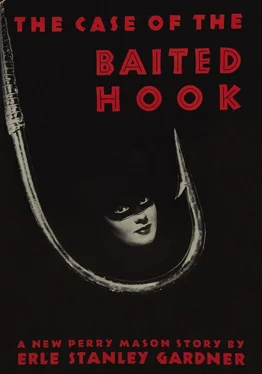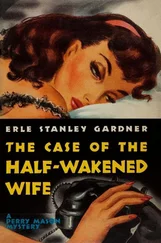“Hello, Paul,” Mason said, affecting surprise. “What’s the idea?”
Drake got to his feet. “So far no one’s told me.”
Sergeant Holcomb said, “Come on, Mason. The D.A.’s waiting.”
Drake shot forward his hand impulsively. “Perry,” he said, “no matter what they say, I want you to know that I’m for you. No one can ever make me believe there’s anything crooked about the way you do things.”
“Thanks,” Mason said, gripping Paul’s hand and feeling, as he did so, a folded piece of paper which Drake had surreptitiously slipped into his palm.
“Come on,” Holcomb said impatiently, standing in a double doorway which led to an inner suite of offices.
The detective who had been seated next to Drake intervened. “You two guys don’t need to go into a huddle,” he said. “Break away.”
Mason turned away, casually slipping his right hand into his trousers pocket.
“This way,” Holcomb said.
Beyond the double doorway, a long corridor stretched past doors bearing the names of deputies. At the far end of the corridor, a mahogany door was inscribed simply with the words, “Hamilton Berger, District Attorney.”
“He’s expecting us,” Sergeant Holcomb said, and opened the door to walk in. Mason followed, and the plain-clothes man, apparently having done his duty by having herded the lawyer thus far, turned to stand with his back to the wall near the doorway.
The automatic door check clicked the door shut.
Mason saw Hamilton Berger seated behind his desk, a barrel-chested, thick-necked individual who gave the impression of having great physical strength and a bulldog mental tenacity.
“How do you do, Mason,” he said. “Sit down over here in this chair.”
Mason nodded and glanced around at the office. A man, who was evidently a shorthand reporter, sat at a little table, a notebook opened in front of him. The page of the notebook which was visible was half filled with shorthand characters, evidently notes taken of a conversation with some other witness. Carl Mattern sat back against the wall looking very self-righteous. Mrs. Tump, seated beside him, glowered belligerently at Mason, and beside her, Byrl Gailord, who had evidently been crying, raised her eyes to regard Mason with hurt dignity. There were dark smudges where the mascara had been dissolved by her tears and smeared by her soggy handkerchief.
“All right,” Mason said. “What is it?”
Hamilton Berger said, “I have sufficient information to justify a warrant for your arrest. Because you are an attorney and so far have had what officially amounts to good standing, I’ve decided to give you an opportunity to explain your actions.”
“Thank you,” Mason said with acid politeness.
“I may say,” Berger went on, “that while you are in good standing at present, that has been due, in my opinion, largely to luck. I have long warned you that your methods would eventually get you into trouble.”
“I think we can dispense with any lectures,” Mason said. “My methods are my own, and my ethics are my own. I’m responsible for both. If you have anything to say, say it.”
Hamilton Berger said, “Sit down in this chair, Mason.”
Mason took the chair which was nearest to the district attorney’s desk, separated by only a few feet from that of the shorthand reporter.
“I warn you, Mason, that this interview is to be reported, and that anything you say may be used against you. You don’t need to make any statements unless you want to. If you do make them, they are to be deemed free and voluntary statements, made without coercion or promises.”
“Forget the formula,” Mason said. “Let’s get down to brass tracks. I know all the preliminaries.”
Berger nodded to Mattern. “Mr. Mattern,” he said, “I want you to tell Mr. Mason exactly what you’ve told me. You can condense it to simply hit the high spots.”
Mattern said, “What’s the use? He knows it all.”
“Nevertheless,” Berger said, “I want you to repeat it.”
Mattern raised his eyes to stare steadily at Mason, a stare of cold accusation. He said, in a strong, well-modulated voice, “I was Mr. Tidings’ secretary. Last Tuesday morning Mr. Mason called at my office.”
“What time?” Mason asked.
“Shortly before nine o’clock,” Mattern said.
Hamilton Berger said, “Kindly don’t interrupt the statement of the witness, Mr. Mason. Your opportunity for a defense will come later. I simply want you to be advised of the information which has been placed in my hands. This is not the time to cross-examine witnesses.”
“If you want to accuse me of anything,” Mason said, “and expect me to answer that accusation, I’m going to know the details. Go ahead, Mattern.”
Berger frowned with annoyance.
Mattern, still with his eyes fixed steadily on Mason, said in the same level voice, “Mr. Mason told me that Mr. Tidings had met with an accident. He didn’t say what sort of an accident. He said that Mr. Tidings, according to his information, was dead, that he was representing Byrl Gailord, that Byrl Gailord was the beneficiary under a trust which Mr. Tidings was administering, that he understood Tidings had intended to make a purchase of a large block of stock in the Western Prospecting Company, that it was very much to the advantage of his client to have the deal go through, that he thought the stock was a good investment for her, and that he was interested in having the amount involved — fifty thousand dollars — earmarked by having it appear that at least that much of Tidings’ funds were held in the Gailord trust.”
“Did he say anything about it being to the interests of other clients to have it appear that Tidings’ death should be assumed by the police to have occurred at a time subsequent to that at which the death had actually occurred?” Hamilton Berger asked.
“Not in so many words,” Mattern said, frowning as though searching his recollection. “I think I’ve already told you exactly what he said, as nearly as I can remember, Mr. Berger.”
“Well, tell it to me again,” Berger said.
“He said that there were reasons which he wouldn’t go into which would make it very much to the advantage of his clients to have it appear that the time of death did not occur until after noon on Tuesday.”
“Did he say client or clients?” Berger asked.
“Clients. I remember that very distinctly,” Mattern said.
“But he didn’t say specifically whether by clients he referred to Miss Gailord and some other client?”
“No, he didn’t. But I do remember that he used the word clients — in the plural.”
“Very well,” Berger said. “Go ahead.”
Mason faced the hostility of Mrs. Tump’s eyes, the silent accusation of Byrl Gailord, and casually took a cigarette case from his pocket. He selected a cigarette and made a search of his pockets for matches. In the course of the search, he managed to extract from his right-hand trousers pocket the folded note which Drake had given him. He snapped a match into flame, and lit the cigarette. As Mattern resumed his statement, Mason made a surreptitious study of the message Drake had slipped him. It had been printed in ink upon a narrow strip of paper. The words were simple and to the point: “Freel is registered in St. Germaine Hotel under name Herkimer Smith, Shreveport, Louisiana.”
Mason shifted the match to his left hand, dropped it into an ash tray; his right hand casually dropped into the side pocket of his coat and deposited Drake’s printed message.
Mattern went on steadily. “Mr. Mason told me that under the law of agency I would have no authority to conclude the deal if Tidings were dead, that his clients wanted the purchase consummated, that it would be better for all concerned to have it appear that the transaction had been completed before Tidings died. He said that if I’d co-operate with him, he’d give me ten thousand dollars when the purchase had been completed.”
Читать дальше












